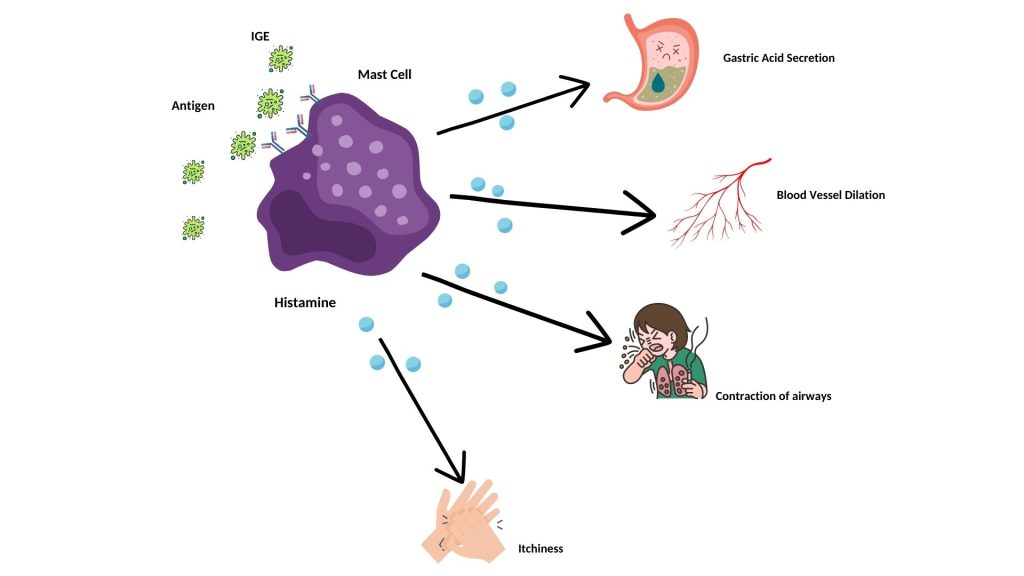
We are all familiar with the term ‘allergies’. If you’re unfamiliar with the term, then you’re familiar with its symptoms: stuffy nose, itchy skin, red eyes, tight chest and many more.
We bombard our bodies constantly with substances: pollen, bacteria, viruses, pesticides, chemicals, dust, food and beverages, and a host of environmental allergens. When you have a healthy immune system, your body can discriminate appropriately between your cells and those of foreign, threatening microorganisms (e.g. bacteria).
Mast cells are your body’s first line of defence against foreign invaders. An allergic reaction starts when your cells release a mast cell. The figure below explains what happens to tissues when a mast cell activates.

Once the invader has been successfully removed, your body switches off the offensive and returns to normal. This immune response is known as acute inflammation because it occurs over a short period of hours or days at most. However, when your immune system becomes overactive, you can have a chronic immune response that lasts for months, years or even decades! What’s more, harmless substances (e.g. broccoli) threaten your body and you become allergic.

As crucial as a mast cell is, so devastating its effects can be when they overreact to substances like food. In essence, a patient’s body releases either too many mast cells or releases them indiscriminately, thereby attacking healthy tissues. Mast cells are also at the core of a common inflammatory condition only identified in the last decade, including a group of conditions known as Mast Cell Activation Disorder (MCAD). I will dive deeply into the role of mast cells in our immune system in a future post.
In the absence of nutrient-dense food (e.g. beans, greens, etc.) or in the presence of stress, inflammation can wreak havoc throughout the body. Inflammation and stress lead to a gut not absorbing nutrients properly, resulting in nutritional deficiencies even on a relatively healthy diet!
Chronic inflammation lies at the heart of all chronic diseases. Some people lie on the mild part of the inflammation spectrum and experience mild periodic fatigue, while others are more severe or sometimes debilitating chronic symptoms.
Regardless, your body is trying to tell you something. Some of the conditions at the heart of inflammation include:
Allergies
Bowel conditions (e.g. irritable bowel syndrome)
Psoriasis
Diabetes
Chronic heart disease
Arthritis
Cancer
Inflammation is like an explosion going off inside your body. In a healthy person, the effects are contained because safeguards are in place to prevent collateral damage to neighbouring cells or tissue. When inflammation gets released, it leads to even more inflammation, which leads to even more inflammation in a vicious cycle.
Chronic inflammation may be milder than acute inflammation, but in the long term can be more damaging to tissues, nerves and organs. The immune system becomes overactive and turns on the body’s healthy cells. Instead of healing, your body causes damage to healthy cells and tissues. This process is known as autoimmunity. It is essential to know that there is a progression to autoimmunity, which does not happen overnight. There are over eighty identified autoimmune diseases, the best-known being Type 1 diabetes, lupus, rheumatoid arthritis, and multiple sclerosis.
The good news is you can retrain your body to effectively discriminate between friend and foe with the proper nutrients, food and protocols.
In the following article, we will look more closely at what inflammation does to the gut, the Mother of the immune system.
